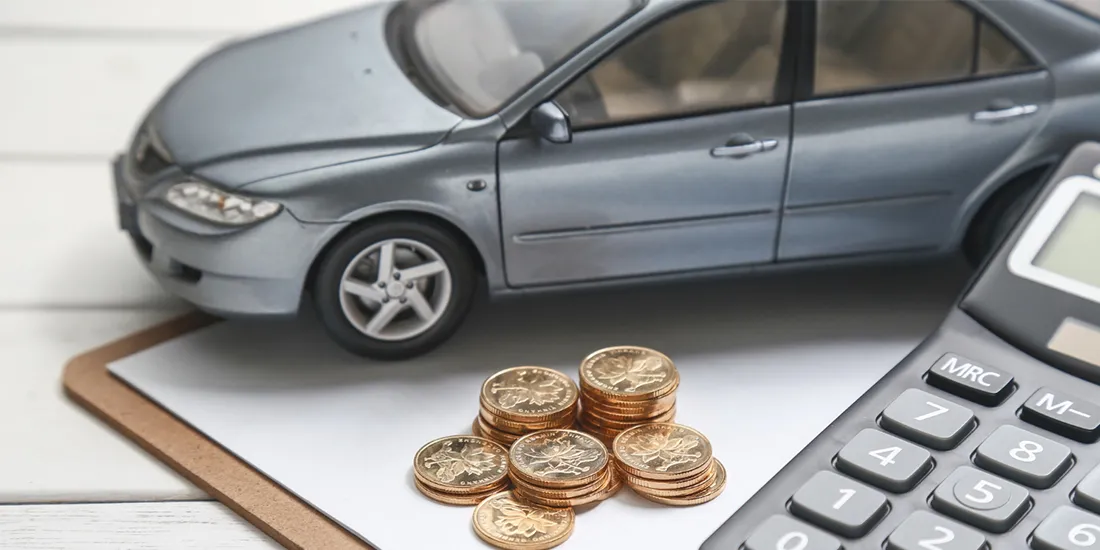
Loans Using Your Car as Collateral
9 Min Read
- Can I use a car as collateral for a personal Loan?
- How does an auto collateral Loan work?
- Types of car collateral loans
- Benefits and risks of using a car as collateral for a personal Loan
- Eligibility and requirements
- How to apply for an auto-secured loan?
- Where can I get a Loan using my car as collateral?
- Alternatives to car title loans and auto equity loans
- Bottom line
Key Takeaways
- Your car may serve as an extra repayment guarantee when you take out a personal loan.
- Car collateral loans come with risks since you can lose your vehicle in case of default.
- This type of loan suits borrowers with bad credit and can offer lower interest rates compared to unsecured options.
- However, some auto collateral loans specifically tailored to bad credit borrowers have high interest rates and short repayment terms, making them difficult to handle.
Loans secured by a car are known for being easier to get as they carry less risk for a lender. They also have lower interest rates and may offer higher amounts compared to unsecured options. However, these benefits go hand in hand with the risk of vehicle repossession if the loan is not repaid on time. Therefore, you need to approach them cautiously.
Below, we’ll cover the most common auto-secured loan types and how they work to help you assess the pitfalls and make an informed choice.
Can I Use a Car as Collateral for a Personal Loan?
Car owners who have enough equity in their vehicles can use them as collateral for a personal loan, even if they still owe on it. This extra repayment guarantee reduces the lender’s risk, making it easier to get approved on favorable terms. When you use your car as collateral, you typically retain ownership and can drive it during the life of the loan. However, the lender places a lien on your car’s title and may seize it and sell it to recoup losses if you default.
How Does an Auto Collateral Loan Work?
With an auto collateral loan, you borrow money against the equity you have in your car. The amount you can get is typically a percentage of the car’s value that you own outright. If your vehicle is worth $7,000 and you still owe $3,000 on it, the equity you can tap into is $4,000.
If you qualify, a lien is placed on the title of your car, securing the loan. You will receive the approved amount upfront and need to repay it with interest within a set period. The repayment is made either all at once or in fixed monthly installments, depending on the loan type.
Types of Car Collateral Loans
Below are the most commonly used options you can turn to if you’re considering using your car to secure a loan.
Auto Equity Loans
An auto-equity loan provides you with money against your car’s value, even if it is still not paid off. With its help, you can get up to 125% of the difference between the vehicle’s market price and the outstanding auto loan balance. These loans often have convenient repayment periods of up to 84 months and are repaid in equal monthly installments. Interest rates usually range from 5.2% to 35.99%. Borrowers with bad credit can still qualify.
Secured Personal Loans
Secured personal loans are offered by local banks, credit unions, and online lenders. Each loan provider may set its requirements for a pledged asset, but you typically need to own your vehicle outright to qualify. The portion of the car’s value you can borrow will be determined based on its mileage and age, as well as your credit. The repayment period is typically between 12 and 84 months, while average APRs are from 5.99% to 35.99%. Certain minimum credit score requirements may still apply.
Cash-out Refinancing
With a cash-out refinancing, you can replace your current auto loan with a larger one and use the difference for your personal needs. The amount you can get extra is calculated based on your credit score and the equity you currently have. Average APRs range from 4.49% to 21.99% but may be higher for borrowers with fair to bad credit. Lenders usually allow for repayment within 24 to 96 months, making it easier to handle payments.While this option seems tempting, there’s the risk of becoming upside down on your loan. This means your loan-to-value ratio (LTV) increases over time, leaving you with more in debt than the car currently costs.
Car Title Loans
A car title loan offers financial help for people with bad or no credit who need emergency cash for a short period. These loans allow you to borrow between 25% and 50% of your vehicle’s market price and require you to repay the funds in full over 15 to 30 days. No hard credit check is typically needed to qualify. Interest rates may exceed 300% APR, but state caps apply. Car title loan lenders usually do not accept cars with a lien already placed on them. This way, you can only get a title loan if you do not owe on your auto.
Benefits and Risks of Using a Car as Collateral for a Personal Loan
Providing your car as collateral allows you to distract the lender from your credit profile, making the loan more accessible. However, it also comes with certain pitfalls you need to be aware of in advance. Here are the pros and cons to consider:
Benefits
- Easy approval. An extra guarantee ensures a loan provider will get their money back, making them more lenient and willing to lend.
- Lower credit score requirements. Secured loans are available to people who can’t otherwise qualify for financial assistance.
- Favorable terms and interest rates. A pledged asset unlocks a longer repayment period and lower APRs, making your monthly payments affordable.
- Fast funding. Many lenders provide borrowers with the money in as little as 1 business day after approval. Some loan providers may even offer same-day cash options.
Risks
- Repossession risks. If your financial situation changes, and you can’t handle payments anymore, a lender can seize your car to cover the losses.
- Limited loan amounts. You can only borrow a portion of the equity you own in your vehicle.
- Risk of going upside down on your loan. As cars depreciate quickly, you can find yourself owing more than the automobile is worth over time.
- Vehicle restrictions. Lenders only accept cars that meet certain criteria. Therefore, some automobiles may not qualify to be used as collateral.
- Potential for predatory loan terms. Some auto-secured loans come with three-digit APRs (over 300%) and need to be repaid in up to 30 days, which may lead to extra stress and debt cycles.

Eligibility and Requirements
Each lender may have its own eligibility criteria. However, there are some common items they usually ask for:
- At least 18 years old.
- Valid government-issued photo ID.
- Proof of current address in the state you apply in (utility bill, lease agreement, mortgage statement).
- Proof of income (pay stubs, bank statements, tax returns, profit and loss statements).
- Active bank account details.
- The vehicle’s make, model, year, trim, VIN, and current mileage.
Besides these criteria, you also need to ensure your vehicle meets the lender’s requirements. They usually include:
- Clear title: the vehicle must have no salvage or other branded titles.
- No liens: the title must not have any existing liens or obligations from other loans or leases.
- Car ownership: the car you’re going to pledge is titled in your name.
- Age and condition: some lenders may set an age limit and only accept cars that are less than 10 or 20 years old. The same may apply to mileage and other vehicle characteristics that affect its value.
- Registration: your car must be properly registered in your name in your state of residence, with all the fees and taxes paid.
- Insurance: a copy of your full-coverage insurance card or policy declaration page.
How to Apply for an Auto-Secured Loan?
Here are some common steps to take to request an auto collateral loan:
1. Compare offers
Lenders often allow you to pre-qualify for a loan with no credit check. This way, you can assess your potential APRs, fees, repayment options, and other terms and choose the best offer.
2. Fill out a form
Depending on the lender, you can do it online or at a store. Provide all the required documents and information, and submit your application.
3. Get approved
It typically takes from a few minutes to several hours for a lender to check your personal details, vehicle information, and title status. At this stage, a hard credit check may be performed.
4. Complete the paperwork
If approved, review the final terms and agree to them by signing the contract electronically or physically. This step also involves filing a lien on the vehicle’s title.
5. Receive the funds
The money is typically funded directly into your bank account within 1 to 3 business days. Some lenders may even offer same-day deposits.
Where Can I Get a Loan Using My Car as Collateral?
While large banks typically do not offer auto collateral loans, local ones, such as KeyBank, may provide this type of assistance. Some federal credit unions also have loan products secured by a vehicle, with interest rates capped at 18%. Alternatively, you can get auto equity loans from companies like Mariner Finance and OneMain Financial. Many online lenders also offer car title loans for borrowers with bad credit, although their interest rates are quite high. Just shop around, explore your options, and choose a suitable one from a trusted loan provider that operates in your area.
Alternatives to Car Title Loans and Auto Equity Loans
If auto-secured loans are not the right choice, consider the following alternatives.
Unsecured Personal Loans
Unsecured loans best suit borrowers with strong credit profiles who need to finance long-term life projects or big purchases. They allow you to borrow up to $50,000 for a period of 12 to 60 months without providing any extra repayment guarantee. Interest rates range from 5.99% to 35.99% but are usually higher compared to secured options. Loan providers may also offer unsecured personal loans of up to $5,000 for borrowers with bad credit.
Share-Secured Loans
This type of borrowing provides financing against your own savings. Typically offered by credit unions, these loans can give you 90% to 100% of your share account balance. Interest rates are commonly structured as your savings account rate plus 2-3%. Repayment terms commonly range from 12 to 120 months.
Home Equity Loans and Lines of Credit
Home equity loans work similarly to auto equity loans, but use your home value instead. With a home equity loan, you can get up to 80% of what you own in your house upfront and make fixed monthly payments over 5 to 30 years. A home equity line of credit (HELOC) allows you to borrow money when needed during the draw period within a set limit and only pay interest on what you actually use.
Payday Alternative Loans
A payday alternative loan (PAL) is a borrowing option offered by credit unions that provides a safer alternative to expensive payday and title loans for people with bad credit. PALs come with an amount of up to $2,000 for a maximum period of 6 or 12 months. Interest rates are capped at 28%. Members with bad credit can still qualify, but a hard credit check is usually performed.
Installment Loans
With an installment loan, you can take out a lump sum upfront without collateral and repay the money in fixed monthly payments over a set period. At 1F Cash Advance, you can borrow up to $5,000 for 2 to 24 months. Approval is based on your income and overall financial situation, not your credit score.
Bottom Line
Using your car as collateral is possible, even if you still owe on it. However, it doesn’t always mean it’s the right move for you. Borrowing against your vehicle is still risky and should only be a last resort. If this loan is the best or the only option for you, make sure you fully understand what you’re going into and have a clear repayment plan. Compare offers and choose a reliable loan product that matches your financial situation.
Keep your car. Borrow with no collateral today!Apply


